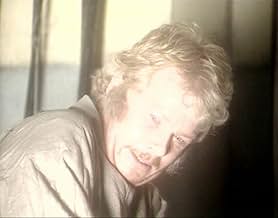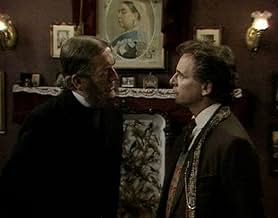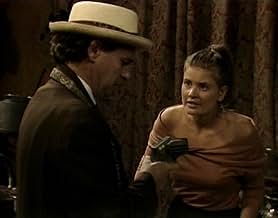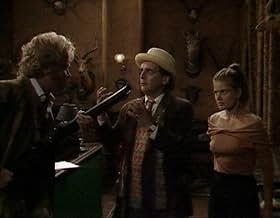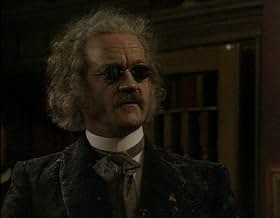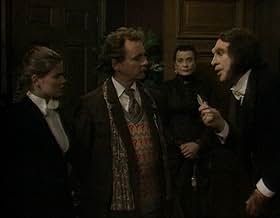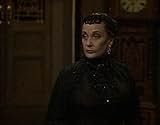The Doctor takes Ace to an old 'haunted' house called Gabriel Chase in the year 1883, 100 years before events that took place within that very house in her personal past.The Doctor takes Ace to an old 'haunted' house called Gabriel Chase in the year 1883, 100 years before events that took place within that very house in her personal past.The Doctor takes Ace to an old 'haunted' house called Gabriel Chase in the year 1883, 100 years before events that took place within that very house in her personal past.
- Night Maid
- (uncredited)
- Night Maid
- (uncredited)
- Night Maid
- (uncredited)
- Maid
- (uncredited)
- Maid
- (uncredited)
Featured reviews
I can see why this story could be seen as Marmite to some, it is one I particularly love. Part one has an incredible sense of atmosphere, which is sinister and unnerving. For several years we had some quite brash sci fi, this was a return to subtlety, everything in this first part is measured and restrained. The menace is hinted at, with servants desperate to leave, and cameras hidden in the eyes of a stuffed emu.
The visuals are sublime, The BBC has its faults, but when it comes to historical dramas, nobody does it better. Sylvester and Sophie are at their very best, one of the best Doctor/companion duos of all time, so easy in each other's presence. The writing is fabulous, deep, mysterious and intriguing, Marc Platt truly delivered.
Michael Cochrane is a delight as Redvers Fenn-Cooper, Sylvia Syms is terrifying as the Stern faced Housekeeper.
Fabulous 10/10
The first part of what would come to be known as the Ace trilogy, which also comprised of the stories The Curse of Fenric and Survival. Ghost Light, pretty much cemented the vision that script editor had for the series. Penned by Marc Platt who would also go on to write the Doctor Who: New Adventures novel, Lungbarrow. It's something of a traditional haunted house story, given a fresh new Sci-fi spin. A gothic horror story that see's Sylivester McCoy's wily and manipulative seventh incarnation taking Ace to Gabriel Chase in 1883. A house that se would burndown 100 years later, although from her perspective, and the whole timey wimey conceit that Steven Moffat during his tenure as executive producer twenty odd years later, has already happened. The story revolves around the Doctor attempting to piece together what drove her to do so, while uncovering the hidden dark secrets and an ancient evil that resides with the Victorian household.
Right from the start, director Alan Waering who had previously worked on The Greatest Show in hte Galaxy and also helmed Survival, establishes a brooding, ominous ambiance. There's all the tropes associated with the Haunted House genre that Waering utilizes to sublime effect. Dark corridoors, a chillding ghostly score and a ghostly apparation which makes it's presence known in the the cliffhanger climax of Part Two.
As with The Greatest Show in the Galaxy and The Happiness Patrol. Ghost Light comprises of an ensemble off quirky, offbeat characters. From Ian Hogg's sinister and ruthless Josiah Samuel (Ian Hogg) Smith, Michael Cochrane's unhinged explorer Redvers Fenn Cooper who saw something in the basement of Gabriel Chase, and drove him to insanity. Then there's Nimrod (Carl Forgione), Josiah's Neanderthal butler, followed by Control (Sharon Duce), the third crewmember of a crashed alien spacecraft and who is Josiah's prisoner, rounded off by the stern housekeeper Mrs. Pritchard (Sylvia Syms) and Gewndoline (Katharine Schlesinger), Josiah's ward. Each of whom are just as quirky and eccentric as the eponymous Time Lord, and who compliment the bizarre mood of the story.
Ghost Light's plot is a riddle wrapped around an enigma, in three parts which amounts to an hour and quarter in length, Platt manages to cram in a complex narrative that is quite simply mindbending. With a steady supply of twists and turns and everything not being quite what it seems. The cast give superbly, idiosynchratic performances, with lead guest actor Ian Hogg fittingly menacing and commanding as the scheming Josiah. While Michael Cochrane and Sharon Duce wonderfully ham things up as Redvers Fenn Cooper and Control respectively.
When Light, played with camp adundance by John Hallam is where the plot then takes a philosophical turn. With McCoys Doctor in complative mode. Challenging the alien apparition on his obtuse opposition to evolotion, and how it is ultimately futile. A deranged and sociopathic mostrosity, Light ranks with Fenric as one of the greatest antagonists of the McCoy era. An abomination with an unmitigated cod complex who flies in the face of creation itself.
McCoy as with previous outings appears to be enjoying himself here, although he does chew the scenery a tad too much, especially in an early confrontation with Light. However he's given some inspired dialogue to work with. Especially his speech about what he hates in a lovelt scene with Sophie Aldred's Ace. Aldred is fine, but is and really was never fully convincing as a teenage girl having been in her late twenties by the time this serial aired. She does however as was always the case, some solid chemistry with McCoy. With there being the kind of pseudo-Uncle/Neice dynamic that the Doctor and his youthful companion have.
There's also some cheeky black humour peppered throughout, with Smith's referring to Frank Windsor's Inspector MacKenzie as "The Cream of Scotland Yard" with absolute relish. As well as some grim, dark horror that has always been assocated with the series. Bringing to to mind Robert Holme's own Victorian set classic The Talons of Weng Chiang.
If there is another slight quibble, it's why would Josiah think assassinating Queen Victoria would restore the British Empire to it's former glory. Nevertheless, Ghost Light along with the rest of the Ace trilogy represents the pinnacle of the McCoy era, and that of Andrew Cartmel's stint as script editor for the series. A genuinely befuddling story, but in the best way possible. It demands repeat performances to truly get to grips with it. It's like a rubbick's cube that needs to be solved, and one that will keep you glued to the screen until the end credits proceed to role.
Ghost Light is a complicated beast, put succinctly in Martin Day, Keith Topping and Paul Cornell's The Discontinuity Guide '...in order to appreciate fully what's going on it is probably necessary to watch Ghost Light two or three times.' This is true to some degree, but there is more than enough to garner from the story on first viewing. This is a story that competently tackles a myriad of ideas and even interpretations of the Doctor Who mythos, something that almost NEVER works in the classic series. Ideas such as "Light" and "Control" being real, physical beings that can interact and exist to us is handled incredibly well, focusing these characters into depictions of Victorian values that, up until this point in the show, weren't as thoroughly demolished through criticism and light scepticism of their ideals and standards (something the modern show has excelled at, as of late).
The relatively short serial tackles a really interesting combination of metaphor-as-narrative storytelling and the darker, but still light and bubbly tone of the McCoy era, which fold onto each other in ways that don't often get presented in the show, let alone most shows.
The continuation of Season 26's ethos of "develop Ace more with each episode" isn't as strong as in the next serial (it's hard to compare anything with The Curse of Fenric, so it's hardly an issue), but there are further glimpses of Ace's clear flaws in an almost setting up of an arc to be followed through and completed in the final two serials.
McCoy's Doctor does exude an air of omniscience in this story, although more towards the final moments, which aligns with the unused ideas of The Doctor's God-like abilities being fleshed out for the unmade Season 27, but in this case this image of the doctor as the manipulator and the all-knowing all-seeing force of nature works into the favour of the serial, as if the overall story is punctuated by Gods and humans, the former battling it out for control, and the latter trying to simply get out alive, back into the light.
I kept rewinding and watching scenes again and again, figuring I must have missed something. Other reviews have said that the DVD extras make things more clear. That's sad. Who would want to subject themselves to more of this nonsensical story? I didn't.
This was the first time I've ever watched a Doctor Who DVD without watching the extras. If you need a commentary to explain what's happening and why, your script is a failure.
The lines whispered by Control through the door are impossible to hear. If you're going to have an actress hiss and slur her lines, don't have her also use made-up words. "Free-ness?" That would have been fine if you could have heard what she was saying underneath all the clanging music, otherwise, use "freedom," and give the viewer a chance. I'm not used to needing subtitles in an English television show. (Glaswegian accents excepted.
As always in the McCoy era, the theme and opening titles are a joke. The music has been sapped of its urgency, and somehow the enormous technological advances since 1963 resulted in amateurish-looking graphics in 1989.
Ideas from script editor Andrew Cartmel were meant to form this story and reveal dark pre-history of the Doctor from times before the First Doctor that viewers knew. These ideas were dropped as Showrunner John Nathan Turner apparently felt it was 'revealing too much too soon' and wanted to drag the storyline out much longer. However, the show was already threatened with cancellation so this tactic was actually leaving the story to be explored in an unknown, uncertain future. Sure enough the show was taken off the air for many years and the ideas of pre First Doctor dark history would be left for novels/spin offs and unexplored in the TV show until 2020 when Chris Chibnall created his version of the idea.
Ghost Light was written by Marc Platt starting with some ideas from the previously planned story but changing it completely. The result is a muddled and confusing story but it does have an enjoyably dark and sinister atmosphere and some good elements. Instead of the Doctor's dark past we explore Ace's dark past and the best part of the story is the psychological aspect of Ace's past trauma and how it links into the story set 100 years before her experience in a derelict mansion. Here we see the mansion in the 1880s with very strange goings on and aliens in the cellar.
The creepy atmosphere, Ace's unease as she starts to feel an evil presence and the intriguing set-up of the mysterious residents in the first episode is the strongest part. It already feels slightly muddled but is a really solid, interesting episode. The second part starts to get more muddled and strange but still maintains some great threads of interest about Ace's involvement and the mystery of the house and some great gothic horror stuff. Part 3 turns into a rather camp, bizarre and confusing mish mash of ideas that are not fully formed with a villain who is quite ridiculous. It still has some good, enjoyable horror feel and strong scenes, mainly the climax of the story thread of Ace's past trauma in the house. Sophie Aldred is great and some of the guest cast are good too but it is all rather bonkers and there are some over the top performances, particularly from the silly, unconvincing bad guy.
Rather jumbled but atmospheric and interesting serial overall.
My ratings: Part 1 - 8/10, Part 2 - 8/10, Part 3 - 7.5/10. Overall - 7.83/10
Did you know
- TriviaThis is Sylvester McCoy's favorite serial of the twelve he starred in. However, he has admitted that he didn't understand it. He was quoted: "It was well done but God knows what it meant."
- Quotes
Gwendoline: [sings] I don't know what it is about my figure and my style / Then when I walk around the passers by do smile / I lost myself in Kensington/about a week today / I asked a cabman my way home / And to me he did say / That's the way to the zoo / That's the way to the zoo / The monkey house is nearly full / But there's room enough for you / Take a bus to Regent's Park / Make haste before it shuts / Next Sunday I shall come and give you such a bunch of nuts
- Alternate versionsWork print version on Blu Ray running at 27 minutes 30 seconds with additional scenes cut before broadcast.
- ConnectionsFeatured in When Worlds Collide (2012)
- SoundtracksThat's the Way to the Zoo
Written & Composed by J.F. Mitchell
Performed by Katharine Schlesinger and Alasdair Nicolson
Details
- Release date
- Country of origin
- Official sites
- Language
- Filming locations
- Production company
- See more company credits at IMDbPro

